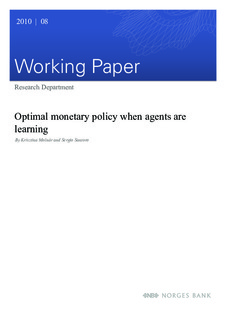Optimal Monetary Policy When Agents Are Learning
Working paper
Published version
Permanent lenke
http://hdl.handle.net/11250/2497455Utgivelsesdato
2010Metadata
Vis full innførselSamlinger
Sammendrag
We derive the optimal monetary policy in a sticky price model when private agents follow adaptive learning. We show that this slight departure from rationality has important implications for policy design. The central bank faces a new intertemporal trade-off, not present under rational expectations: it is optimal to forego stabilizing the economy in the present in order to facilitate private sector learning and thus ease the future intratemporal inflation-output gap trade-offs. The policy recommendation is robust: the welfare loss entailed by the optimal policy under learning if the private sector actually has rational expectations is much smaller than if the central bank mistakenly assumes rational expectations when in fact agents are learning.

